 Top 10 Enterprise Resource Planning Software Leaders Top 10 Enterprise Resource Planning Software Leaders
January 2, 2009 by Julian A. Peterson
The ERP software industry continues to show slow but steady growth despite anemic IT budgets, a depressed economic environment and global uncertainty. For the first time, cloud-based or software as a service (SaaS) ERP and accounting software systems have begun to show steady adoption and are poised for increased mainstream acceptance. Seemingly riding on the coat tails of SaaS CRM acceptance, several analysts see SaaS ERP growth as the next wave in the cloud computing frontier.
In many ways, the ERP software market continues it progress from the prior year. NetSuite continues to show growth but not profits, SAP had announced (but not delivered) its first software as a service (SaaS) ERP solution, Business ByDesign, and Oracle is claiming to have reached major milestones with its Fusion project. Despite a volatile period, this year's Top 10 Enterprise Software Leaders have demonstrated tenacity and perseverance during both good times and bad. This year's list cites the influential executives, analysts and thought leaders that help form and mold the industry's evolution.
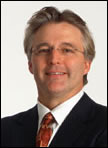 |
Zach Nelson
Since the December 20, 2007, IPO, Zach Nelson has had the enviable challenge of growing the on-demand ERP software provider under the less than enviable public market oversight. While NetSuite is a company that chooses to share its information carefully, and in fact chooses not share specific information relating to customer churn and system downtime, several analysts and industry insiders have pieced together data which suggests NetSuite's customer churn and business partner churn are alarmingly high. These two factors could impose dire consequences for a subscription-based SaaS ERP vendor. On the more positive front, NetSuite is leveraging its IPO proceeds (as well as the funds available from deep pockets majority owner Larry Ellison) with dramatic marketing spend and growing customer acquisitions. While earning profits remain what may be a distant dream, NetSuite continues to grow revenues. |
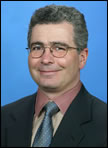 |
Kirill Tatarinov
Kirill Tatarinov is the leader of Microsoft Business Solutions and the successor to Great Plains Software CEO Doug Bergum. Despite not possessing much ERP software systems or channel experience, Tatarinov impressed many in the industry with his straight talk, fresh thinking and new go to market approaches. You may recall that it was Tatarinov that first spoke with a clear and confident voice in declaring Project Green (Microsoft floundering attempt to merge the four acquired ERP applications to a unified code base) dead. Tatarinov has also done an impressive job of better integrating the Microsoft ERP business systems partners with the remaining and much larger Microsoft channel. |
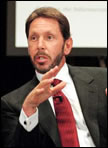 |
Larry Ellison
This year marks another work in progress for Oracle's CEO Larry Ellison. The charismatic CEO continued the Fusion project objectives and the consolidation of the company's merger and acquisition (M&A) integrations. Merging industry leading enterprise systems as a result of the acquisitions of Siebel Systems, PeopleSoft (with JD Edwards), Hyperion and others is a monumental task for even the best run software company. In the constant exchange of barbs with arch rival SAP, Oracle seemed to come out on top more often that not. SAP certainly didn't help their cause when it came to light that subsidiary TomorrowNow posed as Oracle customers in order to inappropriately, and allegedly illegally, download masses of Oracle intellectual property - leaving SAP in damage control mode and Ellison in the cat bird seat. |
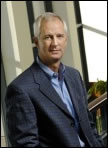 |
Jim Schaper
While SAP and Oracle jockey for top position, it's ironic that the third largest global business systems software company has an identity problem. However, even with $2.2 billion in 2008 revenues, 9,000 employees and more customers than competing enterprise software companies, software holding company Infor hasn't achieved the name recognition such a giant would expect. Perhaps this is because the software company is only six years old. Infor grew from an aggressive M&A strategy financially supported by Golden Gate Capital. The holding company has acquired Baan, Geac, SSA Global, Mapics, Systems Union, JBA and many other name brand enterprise software systems. Infor's strategy is to fill market voids by offering vertical market and industry specific software solutions with strong domain knowledge and the financial backing of a global company. |
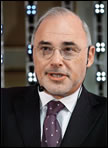 |
Leo Apotheker
January marks a significant leadership change at ERP software giant SAP as Leo Apotheker takes on the full CEO job and Henning Kagermann prepares for retirement. However, like his predecessor, Apotheker's vision for SAP cloud computing is at least partly cloudy. He doesn't think all customers want to, or should, run everything in the cloud. According to Apotheker, "There are certain things that you cannot run in the cloud because the cloud would collapse. It's simple." Apotheker will instead focus his efforts on making all SAP software easier to use by improving the user interface across the suite. "There's one thing that all of us in the enterprise software business didn't do well, for lack of trying," Apotheker said. "We focused on functionality at the expense of figuring out how to make software easy for people to actually consume. We understand that, and we will make sure that you can actually consume real software." Additionally, Apotheker will continue the trying process of getting SAP customers off the prior version and onto the newest version. Apotheker claims about 500 customers a month are moving onto SAP's newest release, ERP 6.0. He predicted that by 2010 all customers will have moved onto ERP 6.0 or the latest Business Suite releases. |
 |
Terry Petrzelka
CEO Petrzelka began building Tectura from a management buy-out from Scitor Enterprises in 2001. Since starting the Microsoft ERP reseller, Petrzelka has managed an aggressive M&A strategy to grow the organization to one of the largest resellers in the world. While prior Microsoft reseller roll-ups have crippled more otherwise successful value added resellers (VARs) than Microsoft would like to remember, Tectura may be the first to achieve wide spread consolidation without becoming itself a troubled company. While Petrzelka has elevated Tectura to the executive halls at Redmond and created a global presence, the reseller has more recently stumbled. Petrzelka's plan to achieve $500 million in annual revenues and 2,500 staff by 2007 is nowhere in sight even a year later. Nonetheless, the CEO continues to advance the Microsoft reseller's business plan and has now been in an IPO quiet period for over a year. |
 |
Kevin Parker
Following a prior year successful IPO, Deltek CEO and President Kevin Parker continues his mission to become a recognized leader in enterprise software, solutions and consulting to project-based organizations worldwide. Deltek's aspirations lie with its vertically focused enterprise resource planning software and clearly defined target markets which include professional services industries such as accounting, architecture, engineering, construction, government contracting, aerospace, consulting, IT services, management consulting, project-based manufacturing, nonprofit and systems integration companies. Prior to Deltek Parker served at CFO and co-President of ERP software maker PeopleSoft. Now with the Deltek reigns under his control, Parker continues the strategic plan introduced in 2008. |
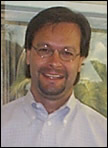 |
Chuck Schaeffer
Several SaaS publishers had a good 2009, however, on-demand CRM and ERP maker Aplicor enjoyed a banner year. Despite promotional efforts which pale in comparison to competitors NetSuite and SAP, Aplicor continues to win more SaaS enterprise customer accounts than either competitor. Aplicor has garnered at least eight clients of more than 1,000 seats each, including the US Department of Commerce at 7,800 seats, Prentice Hall at 5,000 seats, France Telecom at 3,500 seats, Australia's Suncorp at 4,500 seats and Ford with over 1,000 seats. Aplicor has also succeeded in achieving the on-demand industry's highest system uptime and lowest customer churn for the last four years. Notwithstanding some of the hosting industry's biggest wins, Schaeffer seems intent to fly beneath the radar while climbing to the number three SaaS ERP industry position. |
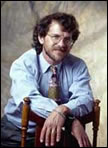 |
Joshua Greenbaum
Greenbaum is a widely recognized 20 year ERP software industry pundit, award-winning columnist and contributing author to industry periodicals such as Datamation.com, Intelligent Enterprise, SearchSAP.com, Managing Automation magazine and Redmond Channel Partner magazine. Before founding his own Enterprise Applications Consulting company, Greenbaum was a founding director of the Hurwitz Group, Packaged Software Strategies Service, which focused on IT, infrastructure and business issues in the enterprise software industry. While working in Europe, Greenbaum wrote the first-ever technical analysis of SAP R/3 for the U.S. market in 1992 and has been a close observer of the ERP software market ever since. |
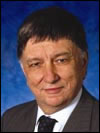 |
Bob Scott
Scott is the Editor of Accounting Technology magazine and author of the annual (killer) VAR 100 report. Scott brings a dry sense of humor and a sense of logical sarcasm to the ERP software and accounting software industries. His focus with accounting software reseller business models and VAR trends provides a unique insight to the global middle market that cannot be found elsewhere. His coverage of Microsoft and Sage as well as their business partner programs are particularly insightful and his Consulting Insights semi-monthly electronic newsletter is always a welcome inbox receipt. |
 |
Next Year's Enterprise Software Leaders?
While its unclear what next y ear will bring for the enterprise resource planning software market, it is clear that any of the advances will of course be born from the vision and business execution of the industry's most notable leaders. If you know a leader that we should put on our radar or have a suggestion for next year's ERP leaders list, please send me an email at julian<at>erpsector.com.
|
|

